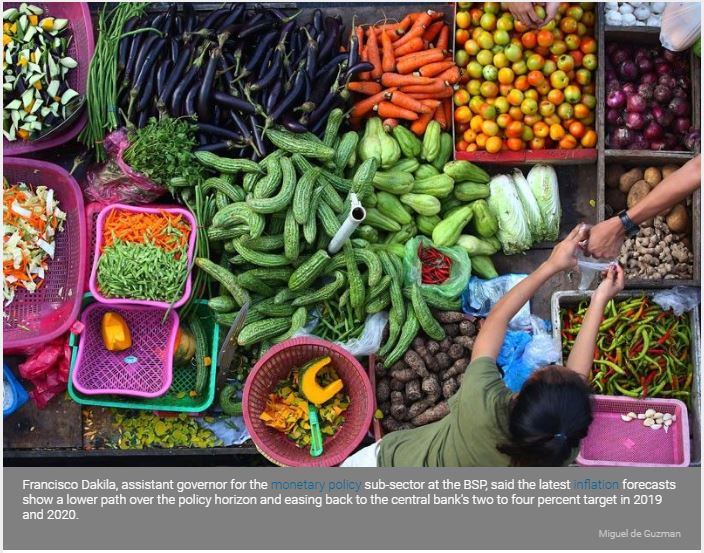Philippines: BSP halts rate hikes as inflation slows
MANILA, Philippines — As expected, the Bangko Sentral ng Pilipinas (BSP) decided yesterday to keep interest rates steady, pausing from a tightening episode that saw rates rise by 175 basis points in five straight rate-setting meetings since May this year to rein in inflation.
Francisco Dakila, assistant governor for the monetary policy sub-sector at the BSP, said the latest inflation forecasts show a lower path over the policy horizon and easing back to the central bank’s two to four percent target in 2019 and 2020.
“Recent headline inflation readings indicate signs of receding price pressures as constraints on food supply continue to ease with the implementation of various non-monetary measures,” Dakila said.
The overnight reverse repurchase rate stood at 4.75 percent, the overnight deposit rate at 4.25 percent and the overnight lending facility at 5.25 percent.
He said inflation expectations have also steadied given the decline in international crude oil prices and the stabilization of the peso against the dollar.
The consumer price index (CPI) averaged 5.2 percent from January to November and remained above the BSP’s two to four percent target.
Inflation eased to a four-month low of six percent in November from a near-decade high of 6.7 percent in October.
Dakila said risks to the inflation outlook have become more evenly balanced for 2019 and lean toward the downside for 2020 amid a more uncertain global economic environment that could further mitigate upward pressures from commodity prices in the coming months.
“Given these considerations, the Monetary Board deemed it prudent for the time being to keep monetary policy settings steady and allow previous monetary responses to continue to work their way through the economy,” he said.
According to Dakila, the central bank would remain vigilant against developments that could affect the outlook for inflation and financial stability.
“The BSP is prepared to take further policy action as appropriate to safeguard its price stability mandate,” Dakila said.
He said monetary authorities now expect inflation to fall below four percent by the end of the first quarter of next year instead of the first half of next year.
“We will drop to below four percent by around the end of the first quarter 2019. This is a significant shortening of the time period where we would be above the inflation target band,” he said.
In the last rate-setting meeting last Nov. 15, he explained the Monetary Board was still expecting inflation would remain above four percent for the first half of 2019 before easing back to the two to four percent range
Dakila said the main drivers behind the moderation in inflation also emanated from the major supply side drivers that drive inflation up.
Non-monetary measures include the passage of the proposed amendments to Republic Act 8178 otherwise known as the Agricultural Tariffication Act of 1996 as well as the suspension of the increase of the excise tax on oil in January under the TRAIN Law.
He added lower Dubai crude oil prices were considered as the central bank expects prices to average close to $63 per barrel next year from the previous projection of $80 per barrel for the fourth quarter this year.
Dennis Lapid, director at the BSP’s Department of Economic Research (DER), said the central bank has lowered its inflation forecasts for the next two years.
This year’s forecast was slashed to 5.2 instead of 5.3 percent, 3.2 instead of 3.5 percent for next year, and three percent instead of 3.3 percent for 2020.
“This is also consistent with our past experience with previous supply shock episodes where we would have a very sharp increase in inflation and then a few months later we will see a steady deceleration,” Lapid said.
Source: https://www.philstar.com/business/2018/12/14/1876805/bsp-halts-rate-hikes-inflation-slows#1ZSPgYCeSwKIYfTf.99


 Thailand
Thailand




